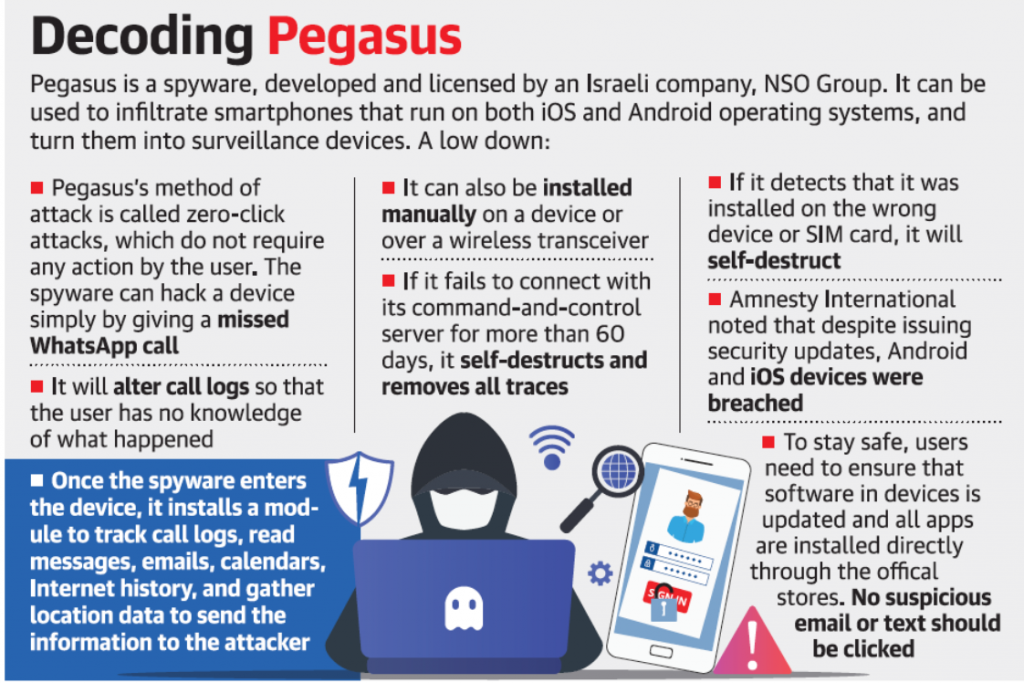[ad_1]

Context:
In recent, a Bench of the Court, led by the Chief Justice of India (CJI), constituted a three-member independent expert committee to conduct an investigation (it will be overseen by a retired judge of the Court) and protect public faith in the constitutional system.
In the world over, this is the first-ever inquiry ordered by any Chief Justice with such wide-ranging terms into spying by Pegasus.
This initiative of the CJI will embolden civilians to question the suppression of rights and instil fear among rulers.
It should reverse the chilling effect. This dynamic order evoked positive responses while some wanted greater relief than what was prayed in the original PILs.
- It is startling to know that governments in India purchase very expensive Israeli software to bug the Opposition and suppress dissent.
- The revelations about the misuse of Pegasus spyware have shaken the world and even India has felt its reverberations.
- In 2019, Whats app accused the government of India of using Pegasus software to hack the phones of journalists, politicians and activists. However, it didn’t reveal any names.
- However, in July 2021, it again came into the spotlight, when Paris-based media NPO and Amenity International published a list of Indians surveillance by the government.
- The Government has stonewalled queries on the subject, has refused to order any probe, and even allowed a whole Parliament session to be washed away as a discussion on the subject was denied.
A worrying silence from the government:
- The Union Government has been consistently silent on the question on whether it had or has invaded the privacy of hundreds of innocent non-accused citizens and what it has done with the collected ‘intelligence’.
- It has a constitutional duty now to justify its defence of ‘national security’ before the Court-appointed inquiry committee or face politico-constitutional consequences.
- The Court turned down the Government’s request to allow it to set up the inquiry committee, as the principles of natural justice will not permit the ‘accused’ to select his investigators.
- The Bench has enough reasons to suspect that the Government is a party to this unconstitutional action (Pegasus).
- It made it clear that allowing that request “would violate the settled judicial principle against bias, i.e., that ‘justice must not only be done, but also be seen to be done’.”
- The use of the invasive spyware was noticed in May 2019 when WhatsApp claims that ‘Pegasus’ had infiltrated the devices of WhatsApp users;
Injures freedom of speech:
- The Bench led by the CJI observed that surveillance injures the freedom of speech and results in fear based self-censorship.
- When it relates to the freedom of the press, it results in a chilling effect on the basic civil right of freedom of speech.
- Using the highly expensive software, Pegasus, is an assault on the vital public watchdog role of the press, which could undermine the ability of the press to provide accurate and reliable information which is needed for people to know about the acts of their elected government.
- The potential technological power of Pegasus must be challenged. The Centre’s complacency is worse than its alleged involvement that needs to be probed.
- In fact, the Court has faced criticism of ‘inaction’, giving a long rope to the Government, and refused to stay the notification issued by the West Bengal government, setting up an inquiry commission to investigate the revelations of the Pegasus Project.
- The Delhi-based lawyer, even wrote that the Court should ask the Government to answer whether it ordered spying on citizens who are not accused of any crime.
- Budapest Convention on Cybercrime: It is an international treaty that seeks to address Internet and computer crime (cybercrime) by harmonizing national laws, improving investigative techniques, and increasing cooperation among nations. India is not a signatory to this convention.
Privacy, a sacrosanct right declared by Supreme court:
- Though privacy was not a specifically guaranteed right earlier, unabated surveillance was never allowed.
- The Supreme Court emphatically defined it in R. Rajagopal in 1994. With the landmark order in 2017 by the Supreme Court declaring that the right to privacy is as sacrosanct as human existence and is inalienable to human dignity and autonomy, the burden to secure this right has also fallen on the top court.
- Snooping can be justified only on three counts: the restriction must be by law; it must be necessary and only if other means are not available, and proportionate (only as much as needed); and
- It must promote a legitimate state interest (e.g., national security), according to the nine-judge Bench judgment on privacy).
- Without establishing this justification, the Government cannot use ‘national security’, in the case of Pegasus, as an empty or lame excuse, because surveillance directly infringes on the privacy right.
- If the Government wants to justify the surveillance as authorised then it has to answer the question whether anybody has been prosecuted for terrorism with evidence procured by snooping.
- The leaked list of phone numbers, which includes those of journalists, politicians and lawyers only raises the suspicion of abuse of surveillance power.
Conclusion:
Using criminal spyware is not only a mere violation of Part III rights but is also a serious blow to freedom of the press, expression of dissent by the Opposition, and fearlessness of lawyers to challenge in courts the unconstitutional actions of the state.
It undermines democracy and converts elected leaders into absolute dictators.
The Supreme Court committee and Bench has the onerous duty of resurrecting the constitutional scheme of rule of law.
[ad_2]

